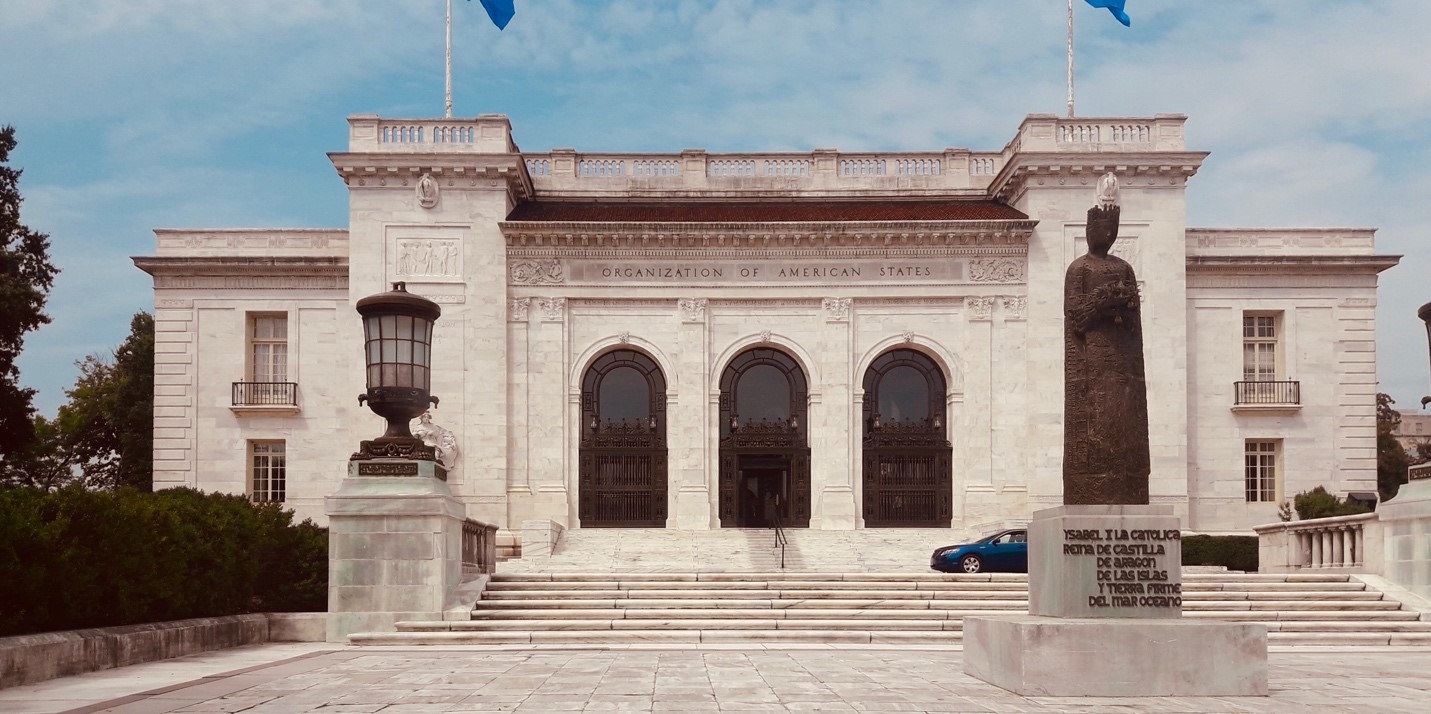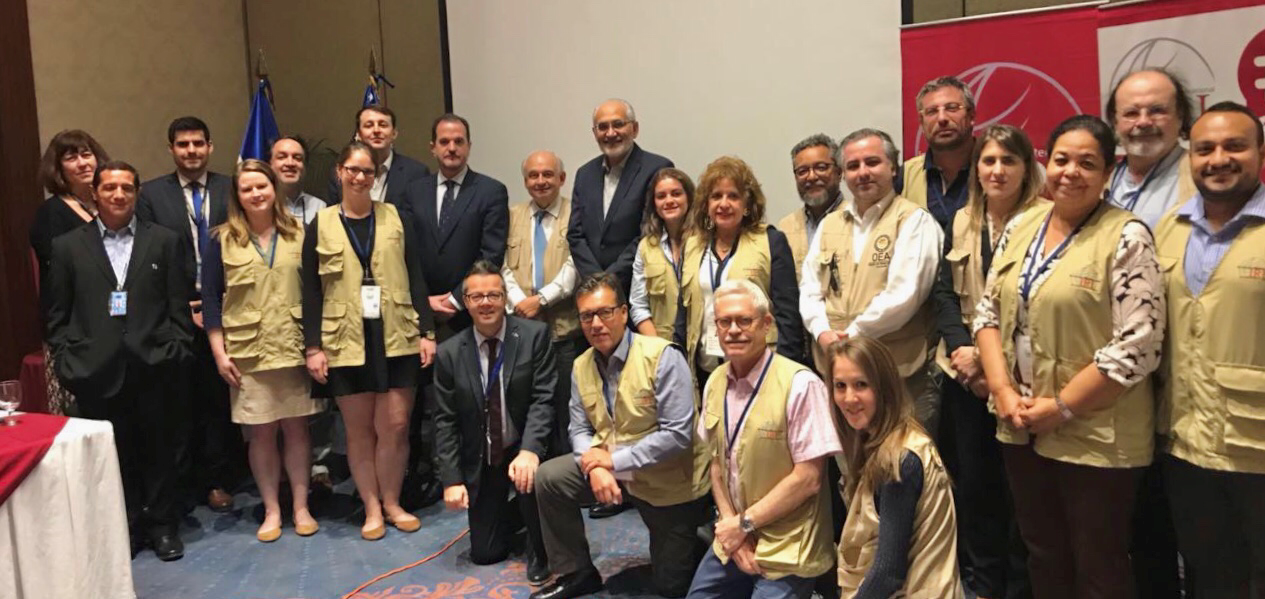Happy Birthday to the Organization for American States

Today, we celebrate the 72nd anniversary of the Organization of American States’ (OAS) charter signing. The OAS is a multinational forum that, much like the International Republican Institute (IRI), embodies a commitment to democracy and good governance throughout the hemisphere. We are proud to continue programming across Latin America that parallels the good work being done by this organization to advance citizen-centered government across the region.
The OAS was chartered over seven decades ago on April 30, 1948 in Bogotá, Colombia. It traces its roots to meetings of American nations that began at the invitation of the United States in 1890 and followed the adoption of the Rio Treaty of 1947, which bound member countries together in case of an outside attack.
Considering that history, cynics might dismiss the OAS as an outgrowth of the U.S. Monroe Doctrine or a well-timed response to the emerging Cold War. While that could be said, the OAS is, in fact, a working club of nations with a broader and more enduring purpose.
To begin with, the OAS is exclusive. Its pillars of promoting democracy, human rights, economic development and regional security set a standard for membership. In contrast, the United Nations charter does not mention the word democracy because a number of its founding states were not democracies, which remains a nettlesome issue with its membership today. What’s more, several dictatorships have enjoyed seats on important U.N. forums such as the Security Council and its Human Rights Council, often blocking important actions.
To be sure, the western hemisphere features other exclusive bodies that have more recently sought to integrate the region or subregions on trade such as the Southern Common Market (Mercosur), or counter the influence of the United States and Canada, like the Union of South American Nations (UNASUR) and the Venezuela-dominated Community of Latin American and Caribbean States (CELAC). And then there is the Spanish influenced Ibero-American Summit process organized around a common heritage. Only Mercosur has a protocol which it has used twice to suspend members (Paraguay, Venezuela) for undemocratic behavior. However, its main purpose is commerce, not necessarily the promotion of democracy and human rights.
In contrast, the OAS is defined by both of these principles. Chapter II of the OAS charter states that the solidarity of the American States requires “the political organization of those States on the basis of the effective exercise of representative democracy.” Since 1962, the body has observed elections and made recommendations to strengthen the hemisphere’s electoral processes. In September 2001, it adopted the Inter-American Democratic Charter stating that the “peoples of the Americas have a right to democracy and their governments have an obligation to promote and defend it.”
The OAS declaration on human rights coincided with the formation of the Organization itself and predates the U.N. Universal Declaration of Human Rights by seven months. It established its Inter-American Commission on Human Rights in 1959 which has investigated more than 12,000 cases of abuses and violations. In 1979, it created the Inter-American Court of Human Rights whose decisions are binding in 24 countries. Today, the Human Rights Commission is watching over freedom of assembly and expression to ensure that governments do not overstep their bounds in responding to the coronavirus.
Beyond these crown jewels, the OAS helps coordinate and strengthen member responses to security threats as drug trafficking and terrorism. It established the Inter-American Drug Abuse Control Commission in 1986 to promote dialogue between member states, multilateral cooperation and to strengthen countries’ ability to prevent and treat drug abuse. In response to growing terror and cyber threats, it created the Inter-American Committee on Terrorism (CICTE) in 1999 to facilitate greater regional cooperation.
Is the OAS above criticism? Not by a long shot. When led by Secretary General José Miguel Insulza (2005-2015), the organization seemed reluctant to call out some of the region’s more authoritarian governments on human rights abuses. In 2009, its General Assembly voted to allow Cuba to re-enter as a member, suspended for half a century—if it joined a dialogue on human rights. To no one’s surprise, Cuba declined. Not long after, members of the U.S. Congress called for cutting U.S. funds, which inspired a course correction under new leadership starting in 2015.
Advocating “more rights for more people,” Secretary General Luis Almagro soon took aim at Venezuela for human rights violations, corralling the media, tilting election processes, limiting free assembly and jailing political opponents—the first open criticism of that government by a senior Latin American leader. In 2018, he invoked the Inter-American Democratic Charter on Venezuela’s case, forcefully advocating for the restoration of democracy there. On his watch, the OAS launched efforts to deal with the deteriorating situation in Nicaragua following that government’s 2018 crackdown, and supported an OAS mission to review Bolivia’s flawed October 2019 election.
Today, advocacy for democracy in the United Nations is still constrained by dictatorships within its membership; UNASUR is all but defunct; and the Venezuela-inspired CELAC is struggling for relevance. In contrast, the Organization of American States continues to be a force for good in the region, and a valuable partner in the effort to extend democracy throughout the hemisphere’s shared geography.
